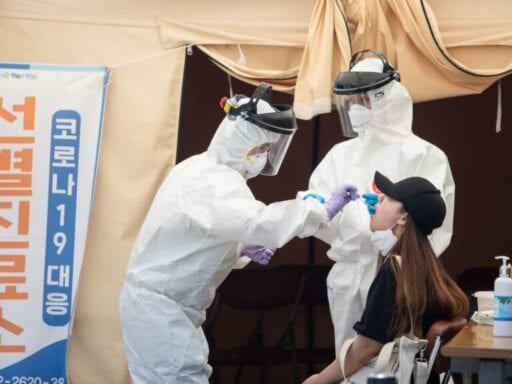A holiday weekend in May has been linked to small outbreaks in the Seoul area.
After an aggressive — and mostly successful — push to limit the spread of coronavirus, South Korean health officials have announced that the greater Seoul area is experiencing a second wave as the number of infections rises.
The number of new cases flatlined in late April due to a nationwide contact tracing and testing effort. But relaxed social distancing guidelines have triggered a series of small, but concerning, outbreaks — like one in May linked to a 29-year-old man who tested positive for Covid-19 days after partying at Seoul nightclubs with more than 7,000 people.
Jung Eun-kyeong, the leader of the Korea Centers for Disease Control, confirmed Monday that the rise in cases is likely linked to increased socializing over a May holiday weekend and could continue to spread unless South Koreans engage in social distancing.
“As long as close contact amongst people continues to take place, the coronavirus trends in and around Seoul have the makings of the next big wave,” she said.
Officials announced 17 new cases on Monday, which is down from the 48 and 67 new cases reported the two days prior. Although these double-digit numbers are small compared to countries bearing the brunt of the pandemic, they’re unmistakably higher than the single-digit numbers South Korea was reporting in late April and early May.
In response to the recent spikes, Seoul Mayor Park Won-soon said he would resume stricter social distancing guidelines if the city sees an average of 30 new cases for three days, or if hospital occupancy reaches 70 percent. The city of Daejeon — which is south of the capital — announced Monday it would ban gatherings in public places like museums and libraries, according to BBC.
Before the second wave, South Korea flattened their curve
South Korea was one of the first countries to experience a serious outbreak of the coronavirus. The first case was reported on January 20, and the number of new cases peaked on February 29, when more than 900 new cases were diagnosed in a 24-hour period.
But the outbreak was quickly managed by widespread testing and contact tracing initiatives, which allowed the country to avoid implementing large-scale lockdowns like the United States.
In addition to drive-through and walk-up testing, South Korean officials communicated information about new spikes and social distancing protocols through emergency text messages. Smartphone apps also helped South Koreans receive preliminary diagnoses via telemedicine.
/cdn.vox-cdn.com/uploads/chorus_asset/file/20047191/coronavirus_data_explorer.png) Our World in Data
Our World in DataThe government also used phone tracking, credit card records, surveillance video, and personal interviews to conduct contact tracing to alert people who may have interacted with a carrier of the virus.
Things appeared to be as normal as they could be during a pandemic — on April 15, South Koreans could vote in elections in person as long as they had a face mask and gloves, and in early May, social distancing restrictions were eased.
To date, South Korea has recorded more than 12,400 cases and 280 deaths — far less than the United States and Brazil, which lead in positive cases with more than 2 million and 1 million, respectively.
Support Vox’s explanatory journalism
Every day at Vox, we aim to answer your most important questions and provide you, and our audience around the world, with information that has the power to save lives. Our mission has never been more vital than it is in this moment: to empower you through understanding. Vox’s work is reaching more people than ever, but our distinctive brand of explanatory journalism takes resources — particularly during a pandemic and an economic downturn. Your financial contribution will not constitute a donation, but it will enable our staff to continue to offer free articles, videos, and podcasts at the quality and volume that this moment requires. Please consider making a contribution to Vox today.
Author: Conor Murray
Read More



